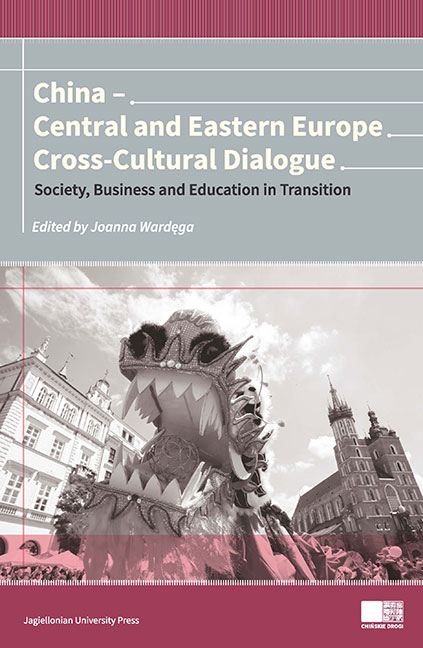Book contents
- Frontmatter
- Contents
- Foreword
- PART I Society and Culture in Transition
- PART TWO Economy and Markets in Transition
- PART THREE Education in Transition
- Opening the Two-Way Fast Lane for China-CEE Cultural Exchange by Equally Valuing the International Promotion of the Chinese Language and the CEE Languages Teaching
- A Contrastive Analysis of Traditional Chinese and Western Teaching Styles – A Case Study
- How Does Learning Style and Teaching Style Jointly Relate to Cultural Intelligence? A Study of Chinese Overseas Students
- Preparation of University Students from Western Cultures for Cooperation with China: Reasons and Methods
- Facing the Challenges of Teaching Chinese through Confucius Classrooms in Slovenian Schools: Current Situation and Prospects
- The Role of the Confucius Institute at Ss. Cyril and Methodius University in Skopje in Promoting the Chinese language, Culture and Business in the Republic of Macedonia
- Education in Transition of China-Based Jesuits from the Austrian Province
- Link in the History: The Development of the Research on Avguštin Hallerstein and its Contemporary Meaning
- Contributors
The Role of the Confucius Institute at Ss. Cyril and Methodius University in Skopje in Promoting the Chinese language, Culture and Business in the Republic of Macedonia
from PART THREE - Education in Transition
Published online by Cambridge University Press: 22 December 2017
- Frontmatter
- Contents
- Foreword
- PART I Society and Culture in Transition
- PART TWO Economy and Markets in Transition
- PART THREE Education in Transition
- Opening the Two-Way Fast Lane for China-CEE Cultural Exchange by Equally Valuing the International Promotion of the Chinese Language and the CEE Languages Teaching
- A Contrastive Analysis of Traditional Chinese and Western Teaching Styles – A Case Study
- How Does Learning Style and Teaching Style Jointly Relate to Cultural Intelligence? A Study of Chinese Overseas Students
- Preparation of University Students from Western Cultures for Cooperation with China: Reasons and Methods
- Facing the Challenges of Teaching Chinese through Confucius Classrooms in Slovenian Schools: Current Situation and Prospects
- The Role of the Confucius Institute at Ss. Cyril and Methodius University in Skopje in Promoting the Chinese language, Culture and Business in the Republic of Macedonia
- Education in Transition of China-Based Jesuits from the Austrian Province
- Link in the History: The Development of the Research on Avguštin Hallerstein and its Contemporary Meaning
- Contributors
Summary
The Republic of Macedonia and the People's Republic of China have strengthened their relations and cooperation since establishing diplomatic relations more than two decades ago. This cooperation has increased in the past ten years, which only emphasizes the importance and the role which the Confucius Institute has had in this process.
The purpose of this paper is to determine the extent of the need for the development of culture-specific Chinese business classes, due to the demand for business Chinese in companies and for personal use. We will focus on those Chinese classes that have been offered and conducted thus far. We plan on providing a concise overview of our teaching program as well as past experiences and results. In our research, we will use the data gathered from the surveys we have conducted among the current Confucius Institute students.
Historical Background of the Sino – Macedonian cooperation
The Republic of Macedonia and the People's Republic of China established diplomatic relations in 1993. In the past, Macedonia and China continued to develop and maintain close bilateral economic relations. This has later been emphasized through the increase of trade between the two countries, as well as the great number of investments and projects funded by the Chinese government in areas such as hydro power plants, IT sector, etc. In 2012, PR China established a USD 10 billion fund for infrastructure projects in Central and Eastern Europe. Macedonia is the first country to have signed an agreement to use part of the funds in the amount of EUR 580 million for the largest-ever Sino-Macedonian joint infrastructure project. The project involves the construction of two new sections of a highway: Miladinovci – Shtip and Kichevo-Ohrid, which is being constructed in Macedonia by SINOHYDRO. One of the biggest investments in the public transport sector was the purchase of 313 buses from Zhengzhou Yutong Bus Company for the purposes of the Skopje Public Transport company – JSP in 2012. In 2014, a contract was signed with CSR Zhuzhou for the procurement of four diesel and two electric trains by the Macedonian national railway operator MZ Transport.
Chinese companies have also left a footprint in the telecommunications sector in Macedonia. In 2006, ZTE signed a contract with the second largest data communication operator Neocom to construct the first optical transmission network in Macedonia.
- Type
- Chapter
- Information
- China - Central and Eastern Europe Cross-Cultural Dialogue Society, Business and Education in Transition , pp. 391 - 406Publisher: Jagiellonian University PressPrint publication year: 2016



